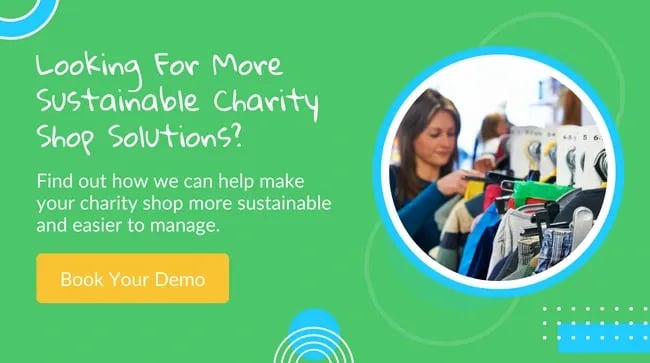
Our planet is facing an environmental crisis that demands immediate and collective action, and as a result, sustainable practices are unequivocally crucial in playing our part in safeguarding the environment. The Charity retail donation/purchase model is inherently sustainable by helping reduce waste and overall consumption levels in the economy, thus helping to lessen the pressure on the planet.
Charity shops don’t usually have the same budget to invest in technology-driven sustainability initiatives as their private sector competitors, but they nevertheless play a significant role in promoting ethical and responsible consumerism.
However, by adopting simple and cost-effective sustainable measures in the way that charity shops are managed and operated, charity retailers can further amplify their environmental contributions and cost savings. Here are some tips and best practices for converting any charity shop into a sustainable model of success.
The benefits of eco-friendly charity shops
A sustainable charity shop not only reduces waste but also contributes to significant cost savings. According to the Charity Retail Association, charity shops divert over 327,000 tonnes of textiles from landfill annually. This results in £27 million saved in landfill tax for local authorities, so imagine the benefits when these shops embrace an even more sustainable approach.
Practical tips for a greener charity shop:
- Recycle waste: Ensure that your stores recycle waste materials, from packaging and unwanted donations to unsold items. This will significantly reduce the amount of waste sent to landfill.
- Promote reusable bags: Encourage your customers to bring their own bags or offer your own branded reusable charity bags for purchase to decrease the usage of single-use plastic bags.
- Set Carbon Zero targets: Assess the aspects of your charity that can be modified to reduce your carbon footprint, such as your store’s energy usage or sourcing of products and materials.
- Use Energy Efficient EPOS: Wil-U’s energy-efficient tablets, for example, are 96% more energy efficient than a regular commercial POS system, reducing both carbon emissions and energy bills typically by £400 per annum.
- Implement energy-efficient lighting: Use LED lights or energy-saving bulbs to reduce energy consumption and costs within your shops.
- Eliminate paper: Set up your EPOS to offer digital receipts and dispense with paper forms for Gift Aid with a digital sign-up system which will also encourage email capture, removing future postage costs.
- Reduce water usage: Install water-saving devices in shop facilities and engage in water-efficient cleaning practices.
Proven Success Stories
Yorkshire Cancer Research, members of the Wil-U family, have become large advocates over the last few years of promoting sustainability through their charity shops. Just in 2022, their charity shops around the UK found new homes for 150,000 items of furniture, clothing, and more, which would have otherwise been sent to landfill. Every day, they are finding new ways to help the planet through their shops, as well as raise money and awareness for helping those with Cancer live a full life with the time they have.
What’s Next?
The need to adopt sustainable retail practices is more pressing than ever. By embracing greener initiatives, charity shops can maximise their positive environmental impact and financial efficiency. To find out more about how our innovative charity EPOS systems can support you in your drive towards a more sustainable retail environment, please get in touch today.
Image Source: Canva
Tags:
POSSep 4, 2023 11:22:00 AM










Comments